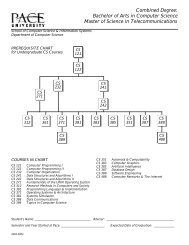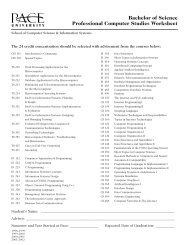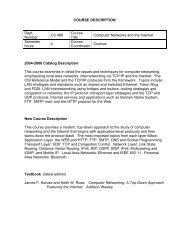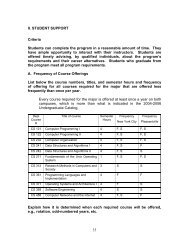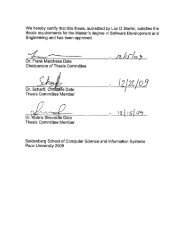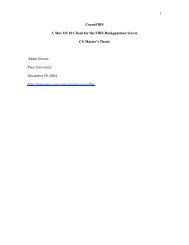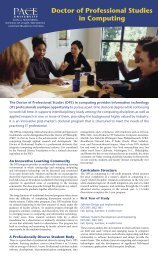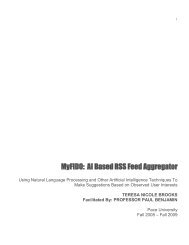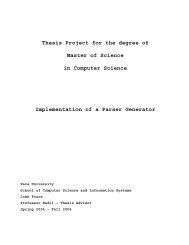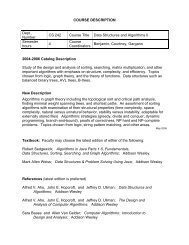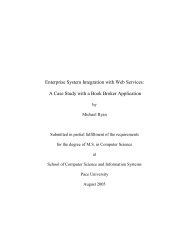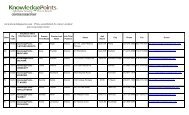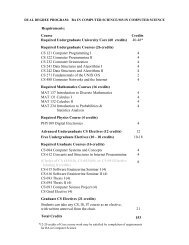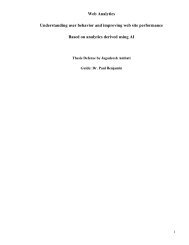I. OBJECTIVES, OUTCOMES and ASSESSMENT A ... - pace university
I. OBJECTIVES, OUTCOMES and ASSESSMENT A ... - pace university
I. OBJECTIVES, OUTCOMES and ASSESSMENT A ... - pace university
Create successful ePaper yourself
Turn your PDF publications into a flip-book with our unique Google optimized e-Paper software.
includes items such as Gartner Group reports, pertinent articles from<br />
professional publications, observations from meetings she attends such as the<br />
Fall 2005 National Science Foundation workshop on the future of computer<br />
science, <strong>and</strong> insights from her participation as a CAC/ABET Commissioner.<br />
Keeping the curriculum in step with industrial practice will occupy our attention for<br />
as long as technology continues to advance. Advisory Board consultations will<br />
continue to be a primary informational resource.<br />
Curriculum Committee<br />
The CS Curriculum Committee, meeting monthly throughout the Fall <strong>and</strong> Spring<br />
semesters, integrates assessment inputs from all sources to make<br />
determinations relative to course content. Also, it is a proactive mechanism that<br />
originates improvements rooted in observations of how students learn. The CS<br />
Curriculum Committee takes responsibility for initiatives on the curriculum<br />
including interfacing with the Advisory Board, for monitoring course content <strong>and</strong><br />
activities, for constructing <strong>and</strong> evaluating the summative assessment, <strong>and</strong> other<br />
inquires, evaluations, <strong>and</strong> controls directly affecting coursework <strong>and</strong> students'<br />
experiences. For instance, outcome d was strengthened when the Curriculum<br />
Committee acted on the Advisory Board’s recommendation for an increased<br />
focus on collaborative skills. The Curriculum Committee acted to do this based<br />
not only on the Advisory Board but also with respect to other assessment<br />
sources (e.g. Academic Program Review).<br />
Academic Program Review<br />
The Academic Program Review is an assessment mechanism introduced by the<br />
Provost’s Office in 2000. The term “program review” is slightly misleading<br />
because the review might focus on a single program but it could focus on all<br />
programs within a department. Regardless of its scope, all program reviews<br />
include a self study, one or more external reviewers, a formal report on the<br />
findings by the external reviewer, <strong>and</strong> a response to this report by faculty (the<br />
Curriculum Committee or a designated subcommittee). When a program review<br />
is scheduled, the responsibility for carrying it forward is with the Dean’s Office.<br />
The latest CS Academic Program Review took place is Spring 2001 <strong>and</strong><br />
encompassed the BS in CS as well as the other computer science programs in<br />
the Seidenberg School, including the MS in CS. The two-day on-site visit was<br />
conducted by Dr. Rachelle Heller, a computer science professor from George<br />
Washington University who spent two days on site.<br />
Relative to the BS in CS curriculum, the report advised that students should<br />
receive more experience with professional, GUI development tools <strong>and</strong> software<br />
25



